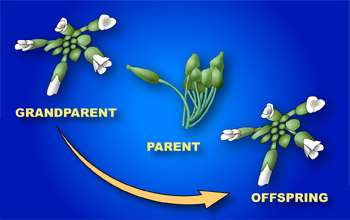News Release 05-045
Reappearance of Missing Genetic Information Poses Exception to the Rule
Code is hiding but not lost

Researchers discovered "missing" genetic information could reappear in later generations.
March 23, 2005
This material is available primarily for archival purposes. Telephone numbers or other contact information may be out of date; please see current contact information at media contacts.
Researchers have discovered that “missing” genetic information unexpectedly reappears in later generations. By poring over the genome of the model plant, Arabidopsis thaliana, scientists at Purdue University found specific genetic information present in a “grandparent” and “grandchild,” even though it was seemingly absent in the “parent.”
The study is featured in the March 24 issue of the journal Nature.
For more than a century, a basic tenet of inheritance has dictated that an organism’s genome passes directly from one generation to the next in a predictable manner—from grandparents—to parents—to children. Now, Susan Lolle, Robert Pruitt and their colleagues have shown this cardinal rule of inheritance is sometimes broken. The scientists reached their conclusion by tracking how genetic information passes through multiple Arabidopsis generations. In violation of current genetic theory, they found a significant percentage of the plant grandchildren had genetic information identical to that of the grandparent, but not the parent.
But how could the child acquire genetic information from its grandparent, if the parent had lost it? Lolle and Pruitt postulate that the “lost” genetic information securely resides outside the standard genome and is only retrieved under particular circumstances when it may be beneficial to restore genomic sequences back to an ancestral state. So, the information was not lost, but rather “hidden”—from scientists anyway.
How does the plant benefit by accessing a cache of its ancestor’s genomic information? Lolle said, “This ancestral information acts like a reserve genetic template that plants can make use of should living conditions become less ideal.” She continued, “In this way, we think plants get a ‘second chance’ to win the genetic lottery.”
Like any good scientist, Lolle was skeptical of her own results and hesitant to believe something so novel was occurring. For years she reasoned there were trivial explanations for what she was seeing. Eventually, however, Lolle could no longer discount the evidence, so she meticulously repeated experiments and verified results, ruling out all explanations afforded by conventional dogma. The data became irrefutable—the genetic information was “skipping” a generation.
It’s a nearly heretical theory. Indeed, the implications will have scientists pondering old results anew. As Rita Teutonico, the National Science Foundation program manager who oversees this work said, “We knew the project was ambitious, but these results challenge us to re-think some genetic paradigms and demonstrate that some very forward thinking ideas warrant investigation.” Teutonico continued, “This result illustrates the benefits of the NSF’s support of bold, high-payoff science.”
-NSF-
-
In non-Mendelian inheritance, a parent plant yields offspring with unexpected genetic traits.
Credit and Larger Version
Media Contacts
Richard (Randy) Vines, NSF, (703) 292-7963, email: rvines@nsf.gov
Program Contacts
Rita A. Teutonico, NSF, (703) 292-7118, email: rteutoni@nsf.gov
Co-Investigators
Susan J. Lolle, NSF, (703) 292-8417, email: slolle@nsf.gov
Related Websites
Purdue News Release: http://news.uns.purdue.edu/hp/Pruitt.inheritance.html
The U.S. National Science Foundation propels the nation forward by advancing fundamental research in all fields of science and engineering. NSF supports research and people by providing facilities, instruments and funding to support their ingenuity and sustain the U.S. as a global leader in research and innovation. With a fiscal year 2023 budget of $9.5 billion, NSF funds reach all 50 states through grants to nearly 2,000 colleges, universities and institutions. Each year, NSF receives more than 40,000 competitive proposals and makes about 11,000 new awards. Those awards include support for cooperative research with industry, Arctic and Antarctic research and operations, and U.S. participation in international scientific efforts.
Connect with us online
NSF website: nsf.gov
NSF News: nsf.gov/news
For News Media: nsf.gov/news/newsroom
Statistics: nsf.gov/statistics/
Awards database: nsf.gov/awardsearch/
Follow us on social
Twitter: twitter.com/NSF
Facebook: facebook.com/US.NSF
Instagram: instagram.com/nsfgov



